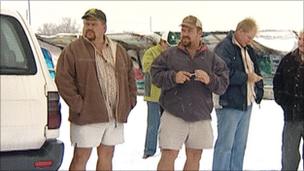Georgia's call for South African farmers
- Published

White South African farmers say land reforms at home are driving them abroad
To revive its agricultural industry, the Georgian government is inviting groups of white South African farmers to settle and farm there - but not everyone thinks it is such a good idea, reports the BBC's Caucasus correspondent Damien McGuinness.
Dressed in shorts, snow is clearly a new experience for these South African farmers.
But this trip to Georgia is about more than seeing a different climate. Johan Swart has come with his wife and his parents to see if the former Soviet republic could one day become his new home.
He says the policies of the South African government are making it increasingly difficult to stay in the country where he was born.
"The government can come to you, and tell you, this is what we are willing to pay for your farm and you have to sell," he explained. "If the government doesn't recognise the value you put on the farm, wants to pay you maybe a half of that, and you have to sell, what security do you have?"
Skills lost
At the end of apartheid in South Africa the majority of the land was owned by the white community, who made up less than 10% of the population. Now, with land reforms under way, some farmers are looking for opportunities elsewhere.
So far, 90 white South African farmers have visited Georgia to look at land for sale.
In the former Soviet Union, Georgian farms were mostly state-run, so many Georgian farmers lost their traditional skills.
According to government spokesman Nikoloz Avaliani, these South African farmers will help to turn things round.
"South African farmers are some of the best farmers in the world. They have good experience and we would like to see such farms in Georgia. There is a lot of potential here."
The Georgian government is giving them a great deal of support, such as advice about where to buy and how to settle in Georgia. And, depending how much foreign investment and jobs the farmers bring with them, they may be able to buy state-owned land cheaply.
But Georgian farmers say they are not getting any help from their own government.
As he herds his four cows alongside a small stream, Vakhtang Menagharishvili says the government doesn't seem interested in helping people like him.
"It doesn't seem very fair," he said. "They should help Georgian farmers first. Then help foreign farmers."
Mr Menagharishvili says government policies are sidelining farmers like him
Poor infrastructure makes it hard to get produce to market, and loans are expensive. So Georgian farmers struggle to make a decent living. Most earn less than $150 (£93) a month.
Mariam Jorjadze, from the agricultural organisation Elkana, says the main problem is that Georgian farmers need advice about how to run their farms more efficiently. The government, she says, is not providing that.
Small numbers of foreign farmers can be beneficial by bringing in investment, she believes. But a large influx would create tensions with local farmers.
"If it becomes policy to sell land to big investors, and if we then see a situation of land-grabbing, then it will be a big problem for our farmers because land is limited."
Good impression
But Mr Avaliani disputes this, saying that many Georgian farmers are looking forward to working together with the South Africans.
"They want to set up joint ventures with South African farmers because they think they could raise the profitability and productivity of their farms," he said. "They are more than delighted to have South African farmers and South African expertise on their farms."
By the end of the tour it is clear that Georgia has made a positive impression on Johan and his family.
"This farm where we are right now is probably the best proposition we've seen so far," he says. "We're excited and there are a lot of possibilities here. It's something that can be considered seriously. But we're still going to have to see more of the farm before we can make a final decision."
If Johan and his wife do end up moving here, it certainly would be a fresh start for them - and perhaps for Georgian farming too.